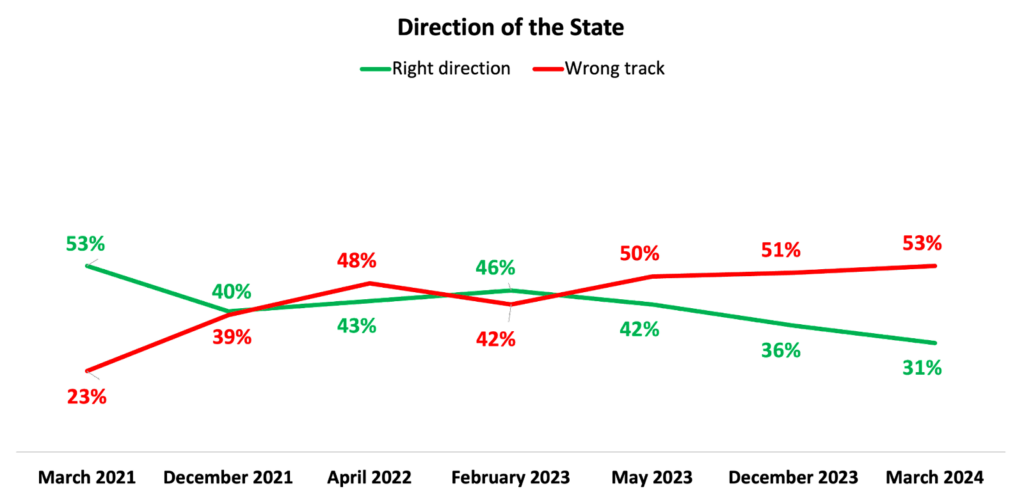TALLAHASSEE – Following the 2024 legislative session, new polling conducted by Florida Watch and Progress Florida, collectively known as the Florida Communications and Research Hub (Hub), shows that Floridians increasingly do not believe their needs are being met by policymakers in the state. This is reflected in their view that the state is heading on the wrong track amid ongoing soaring costs for property insurance and a focus from policymakers on culture war issues that do not address their economic concerns.

The Hub’s statewide polling is weighted to reflect registered active and inactive voters (R+4) and reflects Floridians’ deteriorating sentiments about the direction of the state.
This trend is reflected in their views of the Florida Legislature and Governor Ron DeSantis. As the state’s affordability crisis has deepened, the Legislature’s favorability has dropped to -12%, while Governor DeSantis’ job approval rating is four points underwater.
“All Floridians share the core value that through hard work and determination, we should all have a fair shot at living our version of the American Dream,” stated Florida Watch Deputy Director Natasha Sutherland. “However, they see Governor Ron DeSantis and policymakers in the Florida legislature as more interested in promoting corporate greed, extremist ideology, and self-serving political ambition instead of what’s best for working families and seniors.”
When asked to choose the two issues that are most important to them, Floridians overwhelmingly cite improving the economy (55%) and making housing more affordable (48%). However, they do not approve of the job Governor Ron DeSantis is doing on those issues.
- DeSantis approval on improving the economy: 46% approve / 49% disapprove
- DeSantis approval on making housing more affordable: 26% approve / 62% disapprove
- DeSantis approval on addressing the property insurance crisis: 24% approve / 62% disapprove
Their overall dissatisfaction with the work of the Governor and the Legislature is reflected in their disapproval of some of the major pieces of legislation passed or considered during session. While Floridians do approve of other key legislation that was passed, those policies are detached from their top concerns regarding the economy and affordability.
This stands in contrast to the popularity of progressive economic policies measured by the Hub in December which were introduced during session, but did not receive hearings in the Legislature.
“It is clear that Floridians view this year’s legislative session as a missed opportunity to address the key economic concerns which are driving their dissatisfaction with the direction of the state,” said Progress Florida Executive Director Mark Ferrulo. “Floridians continue to struggle under an affordability crisis that has them wondering if they can keep their homes while insurance rates skyrocket, enjoy a secure retirement, or pay for medical care. Unfortunately, this legislative session was driven by an agenda which failed to provide readily available, meaningful solutions to the kitchen table issues confronting working families and seniors.”
The full memo from the Hub’s Research Department can be seen below.
Date: April 4, 2024
To: Interested Parties
From: The Florida Communications and Research Hub
Subject: Post-Legislative Session Poll Findings
Recent statewide polling from Florida Watch and Progress Florida, collectively known as the Florida Communications and Research Hub (Hub), weighted to reflect registered active and inactive voters (R+4), shows Floridians increasingly dissatisfied with the state of the state. Several unpopular policies were passed during the legislative session and those that Floridians did approve of, failed to address their genuine concerns, which has left them increasingly dissatisfied and disillusioned with the direction in which the state is headed.
This represents a continuing trend from last year, when we witnessed a stark drop in public opinion of the Florida Legislature and the Governor following a legislative session that was focused on culture wars instead of on solving the issues that mattered to everyday Floridians. Since then, Floridians have only grown more pessimistic about the direction of the state and its leaders.
Currently, the two most important issues to Floridians are improving the economy (55%) and making housing more affordable (48%). Floridians express strong disapproval of the Governor’s job performance on both matters.
- DeSantis approval on improving the economy: 46% approve / 49% disapprove
- DeSantis approval on making housing more affordable: 26% approve / 62% disapprove
- DeSantis approval on addressing the property insurance crisis: 24% approve / 62% disapprove
DeSantis has lost ground in his overall job approval and across issues since last May. This erosion is especially prevalent when it comes to affordability issues, as he has dropped -25 on making housing more affordable, -24 on making health care more affordable, and -18 on improving the economy since last May. These shifts come in spite of the electorate growing more Republican by registration.
Several major policies passed or considered during the legislative session were unpopular, while others centered on issues that did not address Floridians’ top concerns.
Meanwhile, popular policies were ignored. The chart below shows a list of policies proposed before the legislative session which enjoyed broad public support in the Hub’s December polling.
Methodology
This poll surveyed 2,485 statewide voters via online panel, IVR, and text-to-web from March 12-18, 2024 and has a margin of error of ±1.76%. This poll has been weighted to reflect active and inactive registered voters in terms of gender, age, geography, race, and party registration (37% Republican / 33% Democrat / 30% NPA).
References to December polling reflect a survey of 2,663 registered voters in Florida via online panel, IVR, and text-to-web from December 1-12, 2023 with a margin of error of ±1.72%. Results were weighted to reflect active and inactive registered voters in Florida at the time by gender, race, age, geography, and party registration (37% Republican / 33% Democrat / 30% NPA).